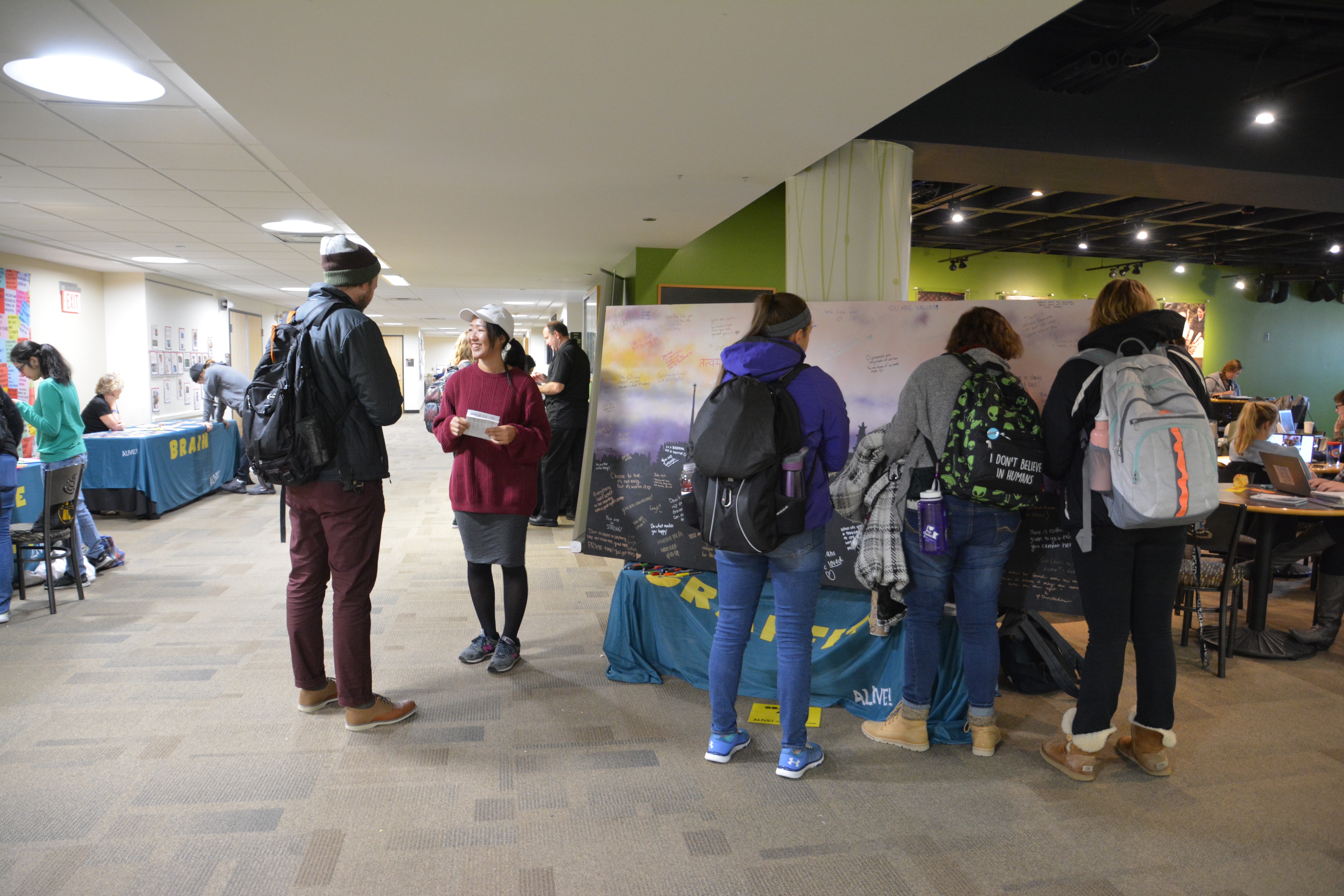This week, in order to raise awareness and adaptability for mental health, the Alive! Mental Health Fair occurred on Monday and Tuesday.
Hosted by the Campus Activities Board and co-sponsored by the Peer Assistants, its goal is to “help advance our campus conversation about mental health and wellbeing,” according to Connor Myhre ‘18, Co-President of CAB. “We hope that students will be able to both reflect on and better understand their own mental health and also better understand what mental health looks like within the Gustavus community.”
Many activities, such as a raffle and a game of Fact or Fiction, get students and staff involved in learning about mental health.
In addition, students can learn about the biology of mental health: “Students can look at brain scans of those affected by depression and other mental health conditions and those that are unaffected,” Myhre said.
Students could also leave anonymous secrets in a box at the information desk, as well as decorate a canvas with inspirational messages about well-being and hope. Both are displayed on the upper level of the Campus Center.
Those who participated in these four activities could enter in a raffle to win prizes like headphones or candy, according to Myhre.
The Campus Activities Board and the Peer Assistants co-sponsored two documentaries played during the week: A Reason to Live and Bullied.
They were available for students to watch in order to learn more about bullying and the circumstances that contribute to suicide, as well as suicide prevention.
Following the screenings were speakers from the Counseling Center, S.M.A.R.T., the Peer Assistants talking about mental well-being and what they can do to help students. Reese Butler, founder of the 1-800-SUICIDE Hotline, also gave a keynote about mental health.
“We are hoping that we can educate as many students as possible both this week and through out the academic year about how to cope with mental health issues as well as how to support any friends that struggle with these issues,” Peer Assistant Erica Jenson said. “We want people struggling with mental health issues to know that they are not alone… there are a host of resources that Gustavus provides for any of their needs.”
This dialogue is an important part of becoming aware of one’s mental health: “We want to provide a welcoming opportunity for students to express themselves and their experiences with mental health as well as learn about some of the complex and personal nuances that affect each person’s well being,” Myhre said.
The fair has made students on campus more aware of mental health issues on campus and within themselves: “Mental health has always been very important to me. I’ve decided to continue eating healthy and get a lot of exercise and sleep to prevent some of the issues I learned about and keep up a healthy lifestyle,” Student Senate Hall Representative Stella Hadjiyanis said.
Later in the week, the Counseling Center put on a Stress and Worry Relief Group in the Campus Center for students to talk about their Learn to Live information.
“Learn to Live offers online programs and tools for Gustavus students struggling with stress, depression, or social anxiety,” reads the Gustavus website. It is a free program and all information is confidential and anonymous.
Also hosted in the Campus Center was a meeting of Stress Busters put on by the Gustavus nursing department. It involves a five minute massage from students trained in massage therapy to relieve stress.
There are also activities for the wellbeing of employees at Gustavus. There are many fitness classes specifically for employees, including yoga, cardio, and TRX put on multiple days a week.
Many students participate in yoga, weekly Meditation Club in the Multifaith Center, Zumba, and other activities on campus to cope with stress and depression.
Many of these activities continue after Mental Health Awareness Week, and the hope is to help people become more aware of these resources.
“In terms of the Gustavus community, we hope to bring about a more inclusive environment for people struggling with mental health issues. We also hope that the education provided through out the week will equip students and faculty/staff to be able to cope with any issues they deal with and support others as well,” Jenson said.
Mental Health Awareness week is called such for a reason; the goal is to help people become more aware of mental health issues and how to prevent these issues in themselves as well as others.
